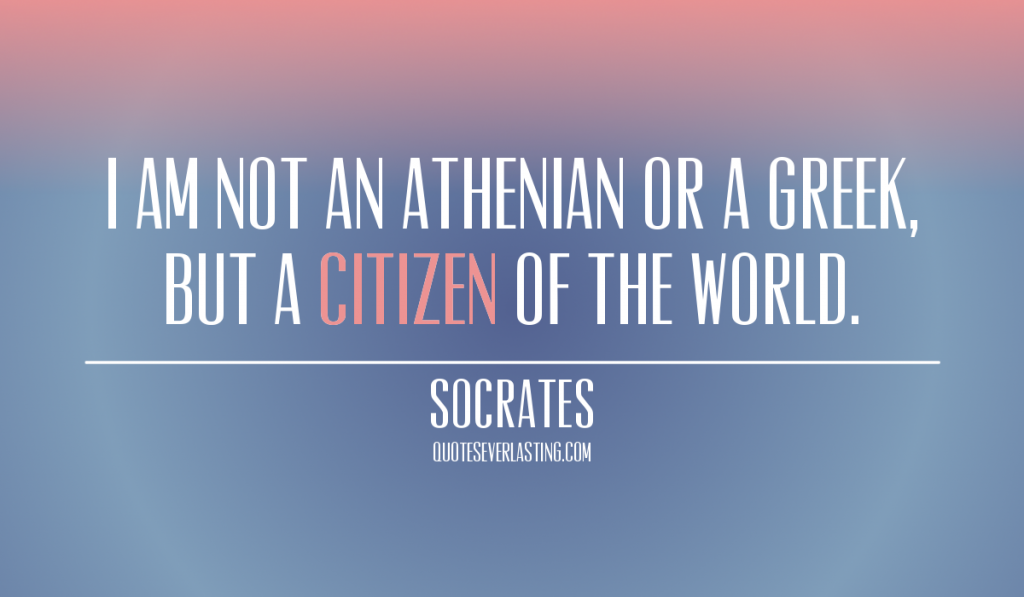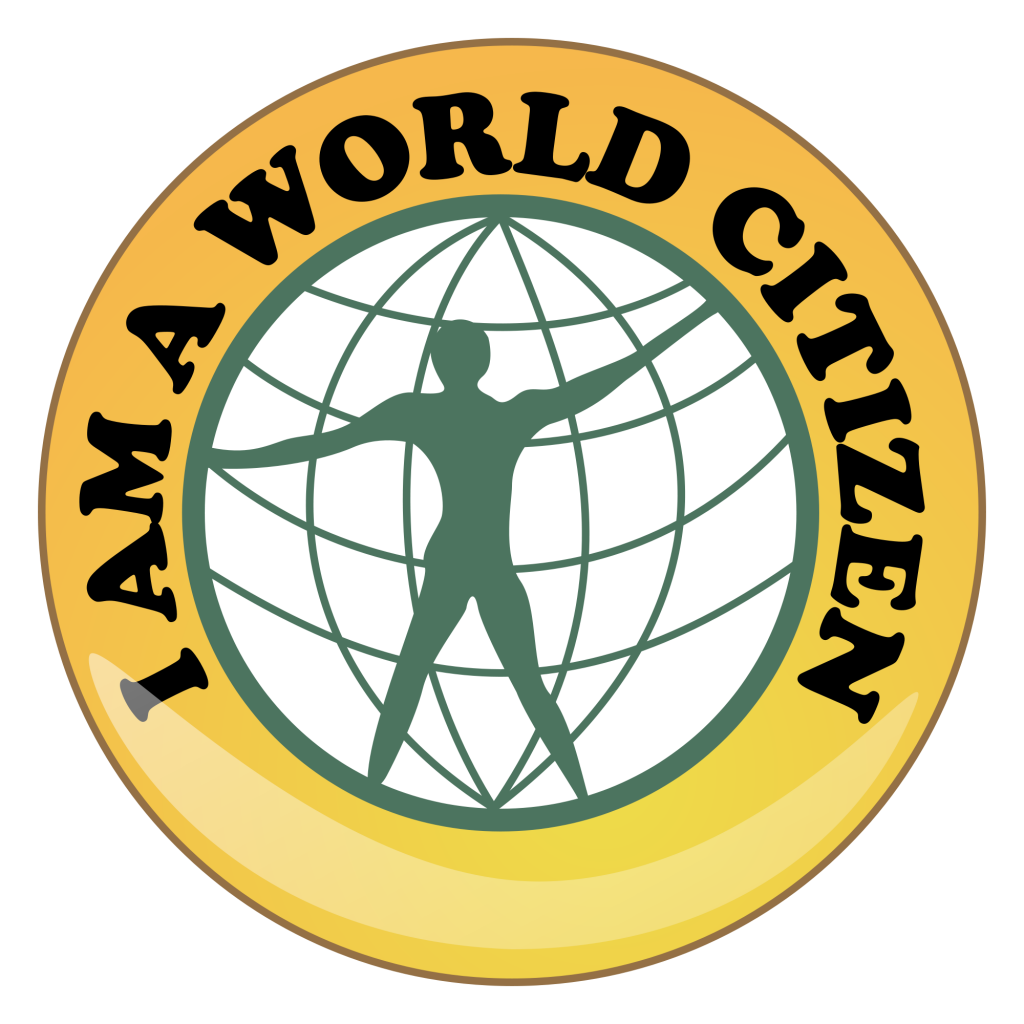Guodong Zhang: Becoming Citizens of the World
Outline
I. Introduction: The Trend of Citizens of the World
A: The Definition of Citizens of the World
B: Why Be Citizens of the World
II. How to Become Citizens of the World
A: Respecting Other People’s Cultures
B: Opposing Biases and Discrimination
III. Conclusion: A Brighter Future
A: World Wide Media and Global Competence
B: Mutual Efforts to Promote Global Citizenship
I. Introduction: The Trend of Citizens of the World
A: The Definition of Citizens of the World
In a global age, the world has become a global village due to technological advances in communications and other spheres of human endeavor. People are living in an increasingly globalized society following that the world has become more related and international than before. At the same time, the term world citizen often appears on the television or in some newspapers.
Basically, the term world citizenship typically defines a person who places his/her identity with a “global community” above his/her identity as a citizen of a particular nation or place. The idea is that one’s identity transcends geographical or political borders and that humankind is essentially one group. The term has been used in education, political philosophy and social movements.1
B: Why Be Citizens of the World
Albert Einstein described himself as a world citizen and supported the idea throughout his life, and he famously said “Nationalism is an infantile disease. It is the measles of mankind.”2 While a person is going to become a world citizen, he has to understand at least three trends.
The first is an economic trend. It is the fact that the globalization of economies and the rise of Asia are the central issues in the early 21st century. Since the 1980s, 2 billion people in China and other Asian countries have moved from a closed economy into a global one. Moreover, most U.S. companies expect the majority of their growth to be in overseas markets, which means they will increasingly require a workforce with international competence. Those facts mean that the world is becoming more diversified. It is a big challenge to face a more complicated and multicultural world.
The second trend is the “Flat World” shaped by new technologies and globalization. The digitization of production since 1998 is making it possible for people to do increasing amounts of work anywhere and anytime. Global production teams are becoming commonplace in business. Therefore, globalization accelerates international migration. New immigrants from such regions as Asia, and Central and South America have changed Canadian demographics and generated the diversity in communities, reflecting the diversity of the world. The new generation has to know more of other cultures and understand and respect different countries.
The third trend involves global environmental degradation and security matters. Every major issue that people face, from global warming to terrorism and weapons diffusion, requires international cooperation among governments, professional organizations, and corporations to solve. Also, alternative energy sources or security measures linked to terrorism require a greater knowledge of the world. 3
In response to these trends, people need a strong global perspective and to incorporate discussions of current local, national, international issues and events. Being a world citizen can help to create international cooperation at all levels, uniting everyone and making the world a better and safer place for all. Moreover, that is why world-citizen movements are always promoted by the international society.
II. How to Become Citizens of the World
A: Respecting Other People’s Cultures
Learning to accept and respect other cultures is an important step that opens one’s mind to the world and enables one to become a world citizen. One should open the doors of one’s mind to accept what other people believe in. One should try not to stereotype or brush things off when one hasn’t actually taken a closer look yet. One should try to get away from the personal frame and adopt an observational one.
1. Trying to Understand Religions.
Though one may have his own faith, he shouldn’t be afraid to look at other people’s faiths.This doesn’t mean one has to change one’s beliefs or what one thinks is true. It simply means people are being open minded and interested in other people’s cultures and lives. Try visiting some different religious places. Remember one should not have to convert or essentially believe everything – just be interested and observed, and remember that everyone has his right to believe in something.
2. Studying Histories and Civilizations.
The way some civilizations developed can be fascinating. Try studying about ancient Egypt, the Indus Valley Civilization or Tudor history. When one starts studying, one will understand how things wove together to form the world we live in today.4
3.Learning New Major Languages.
Language is an aspect of humanity, and it influences culture deeply. Learning what a fellow human speaks helps us to understand how other people think and teaches us more about humankind as a whole, and it also helps us to get a general understanding of our world and the many people and cultures that inhabit it. The more languages we know, the more we understand our species, and that is beneficial no matter what the situation is. 5
B: Opposing Biases and Discriminations
Discrimination and Biases are big barriers to becoming Citizens of the World. Racial bias and discrimination come in a variety of forms. Racism may refer to internalized racism, reverse racism, subtle racism and more. Racial profiling targets certain groups based on the notion that some groups are more likely to commit certain crimes than others. Racial stereotypes are generalizations about members of racial groups that prejudiced people often use to justify excluding minority groups from housing, educational and employment opportunities. Familiarity with the various forms of biases and discriminations may help to counter racial intolerance in society.6
Opposing racism and discrimination is by teaching respect and tolerance, by sharing the common history of all humanity, including its most tragic chapters. Human rights extend to everyone, and everybody should know that they have an obligation to work towards eliminating racism.7
Along with biases and discrimination are common forms of intolerance. Promoting tolerance should aim at countering influences that lead to fear and exclusion of others. The diversity of world’s religions, languages, cultures and ethnicities is not a pretext for conflict, but a treasure that enriches us all.
“Respect and tolerance are liberating acts, whereby the differences of others are recognized as the same as our own and whereby the riches of another culture are taken as the wealth of all” – Irina Bokova, 21 March 20148
Conclusion: A Brighter Future
A: World Wide Media and Global Competence
Embrace the idea or ignore it, while this citizenship is a birthright. Being contributing global citizens who revel in diversity and seek solutions to the challenges facing the world is a kind of responsibility.
World-wide media, such as the Internet, fax machines, satellites, and cable TV are sweeping away cultural boundaries. Global entertainment companies shape the perceptions and dreams of ordinary citizens, wherever they live. Technology has now created the possibility of a global culture and promoted globalization.
In response to globalization, many countries in Europe and Asia are preparing their students for the global age by raising their levels of education attainment, emphasizing international knowledge, skills, and language acquisition, and fostering respect for other cultures.
More and more countries attach importance to the new skills to be successful global citizens. Workers, leaders, and students will need to be knowledgeable about the world, be able to communicate in languages other than English, and be informed and active citizens.9
B: Mutual Efforts to Promote Global Citizenship
Across the United States and Canada, many schools already define their mission as producing students who are prepared for work, citizenship, and leadership in the global era. Teaching about the rest of the world in schools has focused on deeper knowledge, such as understanding significant global trends in science and technology, how regions and cultures have developed and how they interconnect, and how international trade and the global economy work.
For instance, the growing interest in learning Chinese, as shown by the fact that 2,400 U.S. high schools expressed interest in offering the new advanced placement course in Mandarin, suggests that parents and teachers are realizing the importance of communication skills in a multilingual and multicultural world. 10
Within the educational system, the concept of global citizenship education (GCE) is beginning to supersede or overarch movements such as multicultural education, peace education, human rights education, Education for Sustainable Development and international education. Additionally, GCE rapidly incorporates references to the aforementioned movements. The concept of global citizenship has been linked with awards offered for helping humanity.11 Teachers are being given the responsibility of being social change agents. Audrey Osler, director of the Centre for Citizenship and Human Rights Education, affirms that
“Education for living together in an interdependent world is not an optional extra, but an essential foundation”.12
Noteworthy, Global Education Magazine is a digital journal supported by UNESCO and UNHCR, inspired in the universal values of the Declaration of Emerging Human Rights that aims to contribute to achieve the Millennium Development Goals by GCE consciousness. 13

1.Global Citizenship, Wikipedia, March 2015
2.Viereck, George Sylvester (26 October 1929), What Life Means to Einstein: An Interview by
3.George Sylvester Viereck, The Saturday Evening Post: 117
4.Vivien Stewart, (April 2007) Becoming Citizens of the World, Educational Leadership, Pages 8-14, New York
5.How to Respect Other Cultures, www.wikihow.com…, April 7, 2015
6.Why should I learn a language, www.omniglot.com…, Simon Ager, April 7, 2015
7.Nadra Kareem Nittle, Types of Racial Bias and Discrimination, © About.com…, racerelations.about.com…, April 2015
8.Fighting Racism and Discrimination: History, Memory and Contemporary Challenges, Social and Human Sciences Sector, UNESCO, 20.03.2015
9.Message from Ms Irina Bokova, Director-General of UNESCO on the occasion of the International Day for the Elimination of Racial Discrimination, 21 March 2014, unesdoc.unesco.org…
10.Australian Government (2008), Global Perspectives: A framework for global education in Australian schools. Carlton South Victoria, Australia: Curriculum Corporation. ISBN 978 1 74200 075 6
11.Osler, Audrey and Hugh Starkey (2010). Teachers and Human Rights Education, London: Trentham Books. ISBN 978-1858563848
12.Global Education Magazine (2012), The Humanist Quantum Interference: Towards the “Homo Conscienciatus”, Javier Collado Ruano, October 17th: International Day for the Eradication of Poverty. ISSN 2255-033X
Author: Guodong Zhang
Tutor:Ms. Caroline Joll


留言
張貼留言